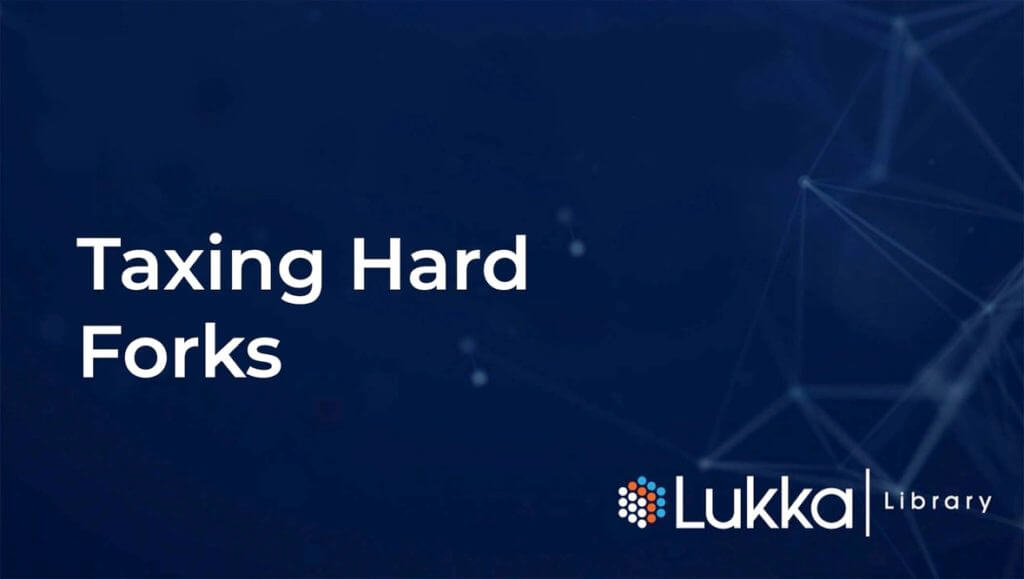Author: David J. Shakow, Professor Emeritus, University of Pennsylvania School of Law
The discussion in this document reflects legal principles as of January 20, 2020.
The statements in this paper represent the views of the author only and should not be attributed to the University of Pennsylvania School of Law. Further, this document should not be treated as legal advice to any reader or to Lukka.
There has been much discussion of the taxation of hard forks. The IRS has recently issued a ruling that it hopes will resolve the questions surrounding this issue. However, controversy still remains.
A classic example of a hard fork was the creation of Bitcoin Cash. As a result of the software changes that brought Bitcoin Cash into existence, all holders of bitcoins automatically became holders of an equal number of units of Bitcoin Cash. Did they have income at that time?
On the one hand, the holders of the bitcoins clearly had a new asset with value in their hands. However, there are two important arguments that have been raised against the immediate taxation of the holders of bitcoins who received units of Bitcoin Cash.
One issue revolves around the question of whether someone should be treated as having income when something of value simply comes into their possession. There are clearly situations when the tax system acknowledges that no income is received. For example, someone who discovers a valuable mineral deposit does not have income until the mineral is mined and sold. When an artist creates an artwork, the artist does not have income until the artwork is sold.
The IRS has long taken the position that someone who finds something of value has income at that time. This issue came to significant public notice when baseball players were creating new home run records, and whoever ended with a valuable record-breaking baseball was, in theory, subject to immediate tax. In that very public context, the IRS had difficulty asserting that income was recognized before the lucky fan sold the baseball. However, in the more common case of someone, for example, finding a significant amount of cash, the IRS continues to assert that there is income at that time. The IRS’s recent decision holds that someone receiving a new asset as a result of a hard fork is subject to tax immediately on the value that was received.
How does the IRS distinguish the hard fork from the person discovering a mineral deposit? Unfortunately, the IRS ruling does not provide much of an explanation for its decision. It has been suggested that the tax law will protect someone whose primary activity is something along the lines of discovering minerals or creating artworks. Although this distinction is nowhere asserted explicitly by the IRS, it provides some basis for distinguishing the hard fork from some of the other situations referred to above, since the person getting the benefit of a hard fork need not have spent any effort in order to obtain that benefit.
A second objection to the position the IRS has taken is a practical one. When a hard fork creates a new asset, the value of that asset may often fluctuate wildly, particularly when it is first created. Moreover, the new asset may not be readily tradable when it is first created—it may be some time before it is easy to dispose of this new asset. As a result, it will be very hard for someone receiving an asset as a result of a hard fork to know what amount of income to include on their tax return.
Despite these objections, the IRS clearly plans to assert that anyone receiving an asset as a result of a hard fork has income immediately. Taxpayers generally cannot avoid taxes by asserting that something they received is difficult to value. This is particularly true when the asset in question clearly has significant value, although its precise value is hard to pinpoint. And, despite the IRS’s reluctance to tax people catching valuable baseballs, it continues to hold that someone receiving something of value, even if it was not sought by the recipient, has income immediately.
There is certainly an administrative problem present here to the extent that many assets created by hard forks are truly difficult to value and are difficult to dispose of until the markets accept their existence. It would be wonderful if Congress stepped in to provide guidance to the IRS. Since that is not a likely result in the near term, the IRS may well find it useful (and welcome) to issue guidance regarding both the value of any new asset and time as of which it will be treated as having been received by the taxpayer, at least in those cases where the hard fork involves an asset that is widely held.
One unfortunate aspect of the IRS’s recent ruling is that the terminology it uses is not consistent with normal industry practice. Although the IRS clearly intended to tax the results of a hard fork, the ruling speaks in many cases of an “airdrop.” An airdrop is not the same as a hard fork. When the issuers of a token provide an airdrop, they usually are simply transferring tokens without asking for any consideration. Although the valuation issues noted before come into play here, particularly because many tokens transferred in airdrops are of little value, it is easier in this context to conclude that the recipients of the airdrop have income.
While some commentators have used the confusion in the terminology used by the IRS in its ruling to suggest that the IRS does not fully understand industry practices, and they may well be correct, there seems little question that the IRS fully intends to tax persons who are enriched as a result of a hard fork. Although there are significant arguments against the IRS’s position, and the IRS has not confronted any these arguments in their rulings in this area, it is likely that the courts will defer to the IRS’s conclusion in an area that they may not feel comfortable analyzing themselves.





